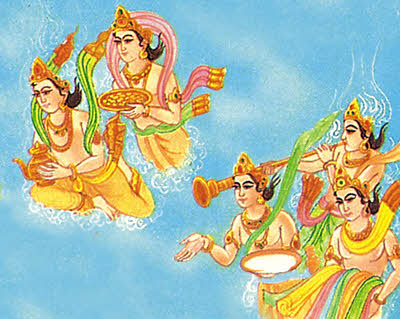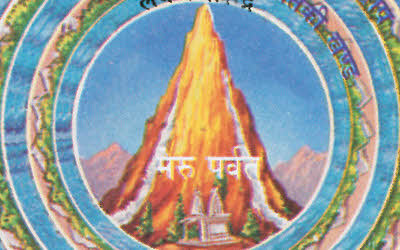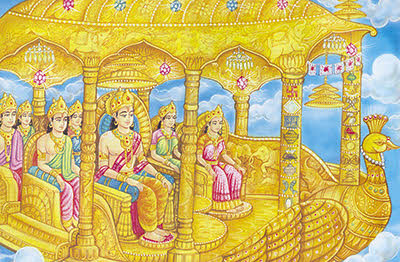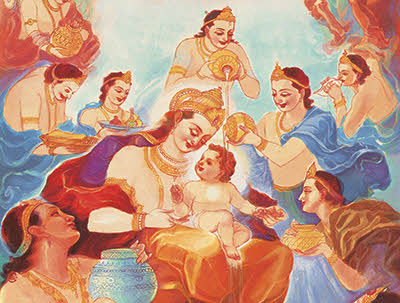
“Reverence to you, O Lord of the Congregation, Protector of the World, Ocean of Compassion, O Lord, son of Sri Nabhi. O Lord, you are resplendent with the three knowledge’s, sense knowledge, etc., innate, like Mt. Meru with the parks, Nandana, etc. O God, this zone of Bharata today surpasses heaven, since it is adorned by you, the crest-jewel of the three worlds. Like you, this day is to be held in respect throughout samsara, purified by the festival of your birth kalyana, O Lord of the World. From the auspicious occasion of your birth, happiness arose even for the inhabitants of hell. For whom is the birth of the Arhats not a destroyer of pain? Henceforth, let Dharma, lost like a (hidden) deposit in the country of Bharata in Jambudvipa, spring up from the seed of your power. Who that has attained to your feet will not cross samsara? Even iron in a ship reaches the bank of the Ocean. Like a wishing-tree in a treeless place, like a river-torrent in the desert, O Blessed One, you have descended into Bharata, because of the merit of the people.”
Having praised the Blessed One thus, the Lord of the first heaven instructed his general of infantry, Naigamesin: “In the middle division of the southern half of Bharata in Jambudvipa, from the wife of the Patriarch Nabhi, Marudeva, a son, a depository of good fortune, is born. Summon all the gods for his birth-bath.” Then striking three times the bell Sughosa which has a wonderful sound for a radius of a yojana, he made it ring. With Sughosa the bells of all the other palaces rang, like birds singing with the bird leading the singing. The sound of these bells increased from the echoes arising in the skies like a family of the noble from sons resembling themselves. Springing up in thirty-two lacs of palaces, the sound expanded in the form of echoes like a word in the palate. The gods sunk in negligence were dazed by that sound. Saying, “What is this?” confused, they paid attention. Vajrin’s general announced to them, attentive, in a voice deep as thunder: “Hear, all you gods. Pakasasana, whose command is not to be transgressed, instructs you with your retinues, goddesses, etc. ‘In the southern half of Bharata in Jambudvipa the first Tirthankaras is born in the family of the Patriarch Nabhi. Hasten, like us, for the purpose of making the kalyana-festival at his birth. Henceforth there is no other duty.’”

Some from devotion to the Arhat, like deer wind wards; some drawn by Sakra’s command, like iron by a magnet; some made to move by their wives, like aquatic monsters by the river-floods; some carried along by friends, like perfumes by the winds the gods came by means of shining cars and other conveyances to Sakra’s presence as if making another heaven. Vasavas instructed an Abhiyogika-god named Palaka, “Make a car that cannot be copied.” Then Palaka, observing the Lord’s command, made a car that filled the sky with a flood of light from a thousand jeweled pillars; having eyes, as it were, in the form of windows; having teeth, as it were, in the form of balconies; having horripilation, as it were, in the form of finials; five hundred yojanas high and a hundred thousand square, moving from the inference of a wish.
There were three flights of steps to the car that were like Mt. Himavat’s rivers with shining waves. In front of them arches made of jewels of various colors had the beauty of a three-fold rainbow. Inside it, the floor, level and round, shone like the moon, like a mirror, like an alingimrdanga, like an excellent light. It made curtains, as it were, over the pictures on the walls by the dense masses of light from inset jeweled slabs. In its center was a theater pavilion made of jewels, adorned with puppets superior to Apsaras. Within the pavilion was a dais made of beautiful jewels, like the pericarp of a full-blown lotus. Eight yojanas in breadth and length and four yojanas in height, it shone like the couch of the Sri of Indra. On it shone a great jeweled lion-throne, as if it had been made by collecting the essence of all the constellations. Above the throne shone a canopy of perfect beauty, studded with various jewels, filling the sky with rays of light. In its center shone a diamond-goad, as if in an elephant’s ear, and a kumbhika-string of pearls resembling the pleasure-hammock of Laksmi. With adjacent half kumbhika- strings of pearls, half so wide as it was, that string had the beautiful appearance of the Gangas with other rivers. As if greedy for the pleasure of touching it, the east wind and other winds, with falering course rocked them slowly, slowly. Blowing between them, the wind made a sound pleasant to hear, as if a flatterer were singing the spotless glory of Indra.
Near his lion-throne in the northwest and north directions and in the northeast, there were so many thrones in succession for the Samanika-gods as there were gods, eighty-four thousand, like crowns of heavenly Sri. In the east there were eight thrones of the eight chief-goddesses, having the same shape, as if produced at the same time. In the southeast direction there were twelve thousand thrones for the gods of the inner council; and in the south fourteen thousand seats in succession for the gods in the middle council; and in the southwest a row of seats of the sixteen thousand gods of the outer council. In the west the seven thrones of the seven generals shone as if fallen from one disc. Eighty-four thousand seats of the body-guards shone in every direction around Sakra, like the stars around Meru. When the Abhiyogika-gods had completed the aerial car, they reported to the Master of the gods. Then Purandaras changed into his best form; for the assumption of any form at will is natural to the gods.

Together with his eight chief-queens like heavenly Sri, Vasavas had interesting things shown by troops of actors and gandharvas. Then, after circumambulating it, he ascended his aerial car, like his own lofty pride, by the east steps. Sahasraksa, his image reflected in the jeweled walls as if he had a thousand bodies, seated himself on his own throne, facing the east. Then Sakra’s Samanikas, like other forms of Sakra, ascended by the north steps and took their proper seats. The other gods entered by the southern steps and sat down, each on his own seat. Before the Master there is no transgression in regard to the seat. In front of the Lord of Paulomi (Sakra) seated on the lion-throne shone eight groups of the eight auspicious things, mirror, etc. The lotus in the form of Bidaujas shone, fair as the moon, and chauris being waved (looked like) hansas approaching (it). In front of the aerial car an Indradhvaja, one thousand yojanas high, shone like a mountain with cascades. Then surrounded by Samanikas and other gods, Sakra looked like the Ocean with a crores of rivers. His aerial car, surrounded by the aerial cars of the other gods, looked just like the principal shrine with shrines in an outer circle. The aerial cars, reflected in each other’s beautiful jeweled walls, shone as if filled with (other) aerial cars. With cries of “Hail! Hail!” from the bards, with the noise of drums, and the sound of musical instruments of troops of Gandharvas and troops of actors reverberating against the quarters of the sky, at the wish of Haris the aerial car set out from Saudharma, just as if splitting the sky. Descending by an oblique path from the north of Saudharma, it appeared like a vessel for the covering of Jambudvipa.”
“O elephant-rider, go from here; my lion will not endure (you).” “O horseman, go away; an angry buffalo is my animal.” “O you with a deer-vehicle, do not come near; for I am riding a tiger.” “O you with a serpent-banner, go away from here; look at the Garuda on my banner.” “Why do you fly near me? You are obstructing movement forward.” “Sir, why do you bump my car with your car?” “Why have you fallen behind? Come quickly. The Lord of the gods is going.” “Do not be angry at the bumping to-day. There is (always) crowding on an auspicious occasion.”
Thus great confusion arose mutually, produced by the eagerness of the gods of Saudharmakalpa following the Lord of the gods. The car with its great flag, descending from the surface of the sky, looked like a ship descending from the crest in the middle of the Ocean. Inside the constellation-circle, like an elephant inside a group of trees, making the sky seem to be covered with clouds, as it were, after crossing numberless continents and Oceans, like the wind in speed, the car arrived at Nandisvaradvipa. Going to Mt. Ratikara in the southeast, Indra contracted the car, like a learned man abridging a book. Then, after crossing continents and Oceans on this side, gradually contracting the car more and more, Vasavas arrived at the central world named Jambudvipa, at the southern half of Bharata, and at the birth-house of the first Tirthankars. Then with the car he circumambulated the Master’s lying-in house, like the sun going around Meru. The Lord of the northeast quarter parked his car in the northeast, like a treasure in the corner of a house.
Then, descending from the car (vimana) like a muni from conceit (mana), with a gracious mind Sakra went to the Master’s presence. At the mere sight of the Lord, the Lord of the gods bowed. For at the sight of the master, a bow is the first present. Then after circumambulating the Blessed One and his mother, Sakra bowed again. In devotion, there is no such thing as repetition. With folded hands on his head, the King of the gods addresses the Lady Marudeva with devotion:

“O Lady, carrying a jewel in the womb, producing light for the world, hail to you, Mother of the World. You are blessed; you possess merit. You have a fruitful birth; you have the best attributes. Among mothers you alone are purifying the three worlds. This first Tirthanatha, the Blessed One, the shower of the hidden path to moksa, a draught-animal for raising up Dharma, was borne by you. I, the Indra of Saudharma, O Lady, have come here to hold the birth-festival of the Arhat, your son. Your Ladyship must not be afraid.” Having spoken thus, Sakra made a sleeping-charm for Lady Marudevi. Then Maghavan made an image of the son of Nabhi, and put it down at the side of Lady Sri Marudeva. He made himself fivefold; then there were five Sakras. Suitable devotion to the Master cannot be made by people with one body. Of these, one Sankrandana came forward, bowed, and said reverently,
“O Blessed One, allow me,” and with auspicious devotion took the Lord of the World, as if he were good fortune incarnate, with hands covered with gosirsa-sandal. One Sakra, going behind, held an umbrella over the head of the Lord of the World, who was the sole umbrella for destroying the heat of the world. Two others, lords of chauris, stood like arms at the sides of the Master, bearing beautiful chauris. Carrying the thunderbolt as a staff, running like a chief doorkeeper, there was another Sunasira, preceding the Lord of the World. The Indras flew through the air, their minds spotless as white garments, surrounded by gods filling the sky with noise by cries of “Hail! Hail!” The glances of the eager gods fell on the Blessed One’s body, like those of thirsty travelers on a pool of nectar. The gods in front wished they had eyes in their backs to see the wonderful beauty of the Lord. The gods going at the side, not satisfied in looking at the Master, were not able to direct their eyes elsewhere, just as if transfixed by a charm. The gods following, wishing to go in front to see the Lord, did not consider their friends, masters, etc. Carrying the Arhat on the door of his heart, as if inside his heart, the Lord of the gods reached Mt. Meru. There the Lord of the east quarter, with the Lord on his lap, sat down joyfully on the lion-throne suitable for the Arhat’s bath on the rock Atipandukambala with a shining luster inside the grove Pandaka to the south of the crest.











No comments yet.
Leave a comment